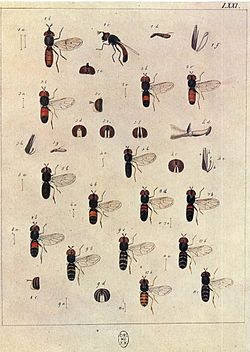| Paragus albifrons | |
|---|---|
 | |
| Paragus albifrons figure in Johann Wilhelm Meigen Europäischen Zweiflügeligen | |
| Scientific classification | |
| Kingdom: | Animalia |
| Phylum: | Arthropoda |
| Class: | Insecta |
| Order: | Diptera |
| Family: | Syrphidae |
| Genus: | Paragus |
| Species: | P. albifrons |
| Binomial name | |
| Paragus albifrons (Fallén, 1817) | |
| Synonyms | |
Paragus albifrons, is a species of hoverfly. It is found from southern Europe across to eastern Asia. [1] [2] [3]
According to a 2014 review of the scarce and threatened Syrphid flies of Great Britain, Paragus albifrons is critically endangered and has undergone a dramatic range contraction. [4]